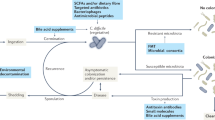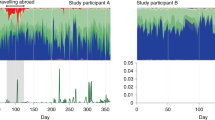Abstract
Clostridium difficile infection (CDI) has emerged as a problem of epidemic proportions. Previous exposure to broad-spectrum antibiotics remains the most important predisposing factor for the disease. However, PPIs are increasingly being overprescribed and recent research has, therefore, focused on the association between PPI therapy and CDI. While the data remain observational, increasing evidence exists for at least a modest association between PPI use and CDI.
This is a preview of subscription content, access via your institution
Access options
Subscribe to this journal
Receive 12 print issues and online access
$209.00 per year
only $17.42 per issue
Buy this article
- Purchase on Springer Link
- Instant access to full article PDF
Prices may be subject to local taxes which are calculated during checkout
Similar content being viewed by others
References
Archibald, L. K., Baurjee, S. H. & Jarvis, W. R. Secular trends in hospital acquired C. diff disease in the US from 1987–2001. J. Infect. Dis. 189, 1585–1589 (2004).
Fekety, R. & Shah, A. B. Diagnosis and treatment of Clostridium difficile colitis. JAMA 269, 71–75 (1993).
Miller, M. A. et al. Morbidity, mortality, and healthcare burden of nosocomial Clostridium difficile-associated diarrhea in Canadian hospitals. Infect. Control Hosp. Epidemiol. 23, 137–140 (2002).
Kyne, L., Hamel, M. B., Polavaram, R. & Kelly, C. P. Health care costs and mortality associated with nosocomial diarrhea due to Clostridium difficile. Clin. Infect. Dis. 34, 346–353 (2002).
Deshpande, A., Pant, C., Jain, A., Fraser, T. G. & Rolston, D. D. Do fluoroquinolones predispose patients to Clostridium difficile associated disease? A review of the evidence. Curr. Med. Res. Opin. 24, 329–333 (2008).
O'Connor, J., Johnson, S. & Gerding, D. C. diff infection caused by the epidemic B1/NAP1/O27 strain. Gastroenterology 136, 1913–1924 (2009).
Bartlett, J. & Perl, T. The new Clostridium difficile—what does it mean? N. Engl. J. Med. 353, 2503–2505 (2005).
Cunningham, R. & Dial, S. Is overuse of proton pump inhibitors fueling the current epidemic of Clostridium difficile associated diarrhea? J. Hosp. Infect. 70, 1–6 (2008).
Williams, C. & McColl, K. E. Review article: proton pump inhibitors and bacterial overgrowth. Aliment. Pharmacol. Ther. 23, 3–10 (2006).
Jump, R. L., Pultz, M. J. & Donskey, C. J. Vegetative Clostridium difficile survives in room air on moist surfaces and in gastric contents with reduced acidity: a potential mechanism to explain the association between proton pump inhibitors and C. difficile-associated diarrhea? Antimicrob. Agents Chemother. 51, 2883–2887 (2007).
Dial, S., Delaney, J. A., Barkun, A. N. & Suissa, S. Use of gastric acid-suppressive agents and the risk of community-acquired Clostridium difficile-associated disease. JAMA 294, 2989–2995 (2005).
Louie, T. J. & Meddings, J. Clostridium difficile infection in hospitals: risk factors and responses. CMAJ 171, 45–46 (2004).
Walker, K. J. et al. Clostridium difficile colonization in residents of long-term care facilities: prevalence and risk factors. J. Am. Geriatr. Soc. 41, 940–946 (1993).
Shah, S., Lewis, A., Leopold, D., Dunstan, F. & Woodhouse, K. Gastric acid suppression does not promote clostridial diarrhoea in the elderly. QJM 93, 175–181 (2000).
Lowe, D. O., Mamdani, M. M., Kopp, A., Low, D. E. & Juurlink, D. N. Proton pump inhibitors and hospitalization for Clostridium difficile-associated disease: a population-based study. Clin. Infect. Dis. 43, 1272–1276 (2006).
Pepin, J. et al. Emergence of fluoroquinolones as the predominant risk factor for Clostridium difficile-associated diarrhea: a cohort study during an epidemic in Quebec. Clin. Infect. Dis. 41, 1254–1260 (2005).
Muto, C. A. et al. A large outbreak of Clostridium difficile-associated disease with an unexpected proportion of deaths and colectomies at a teaching hospital following increased fluoroquinolone use. Infect. Control Hosp. Epidemiol. 26, 273–280 (2005).
Al-Tureihi, F. I., Hassoun, A., Wolf-Klein, G. & Isenberg, H. Albumin, length of stay, and proton pump inhibitors: key factors in Clostridium difficile-associated disease in nursing home patients. J. Am. Med. Dir. Assoc. 6, 105–108 (2005).
Cunningham, R., Dale, B., Undy, B. & Gaunt, N. Proton pump inhibitors as a risk factor for Clostridium difficile diarrhoea. J. Hosp. Infect. 54, 243–245 (2003).
Dial, S., Alrasadi, K., Manoukian, C., Huang, A. & Menzies, D. Risk of Clostridium difficile diarrhea among hospital inpatients prescribed proton pump inhibitors: cohort and case–control studies. CMAJ 171, 33–38 (2004).
Dial, S., Delaney, J. A., Schneider, V. & Suissa, S. Proton pump inhibitor use and risk of community-acquired Clostridium difficile-associated disease defined by prescription for oral vancomycin therapy. CMAJ 175, 745–748 (2006).
Yearsley, K. A. et al. Proton pump inhibitor therapy is a risk factor for Clostridium difficile-associated diarrhea. Aliment. Pharmacol. Ther. 24, 613–619 (2006).
Leonard, J., Marshall, J. K. & Moayyedi, P. Systematic review of the risk of enteric infection in patients taking acid suppression. Am. J. Gastroenterol. 102, 2047–2056 (2007).
Weiss, K. Poor infection control, not fluoroquinolones, likely to be primary cause of Clostridium difficile associated diarrhea outbreaks in Quebec. Clin. Infect. Dis. 42, 725–727 (2006).
Cadle, R. M., Mansouri, M. D., Logan, N., Kudva, D. R. & Musher, D. M. Association of proton-pump inhibitors with outcomes in Clostridium difficile colitis. Am. J. Health Syst. Pharm. 64, 2359–2363 (2007).
Nardino, R. J., Vender, R. J. & Herbert, P. N. Overuse of acid-suppressive therapy in hospitalized patients. Am. J. Gastroenterol. 95, 3118–3122 (2000).
NHS National Institute of Health and Clinical Excellence. Dyspepsia: managing dyspepsia in adults in primary care [online].
Sandvik, A. K., Brenna, E. & Waldum, H. L. Review article: the pharmacological inhibition of gastric acid secretion—tolerance and rebound. Aliment. Pharmacol. Ther. 11, 1013–1018 (1997).
Dalton, B. R., Lye-Maccannell, T., Henderson, E. A., Maccannel, D. R. & Louie, T. J. Proton pump inhibitors (PPI) significantly increase the risk of Clostridium difficile infection in a low endemicity, non-outbreak hospital setting: optimizing risk and benefit of PPI therapy. Aliment Pharmacol. Ther. 29, 626–634 (2008).
Author information
Authors and Affiliations
Corresponding author
Ethics declarations
Competing interests
The authors declare no competing financial interests.
Rights and permissions
About this article
Cite this article
Pant, C., Madonia, P. & Minocha, A. Does PPI therapy predispose to Clostridium difficile infection?. Nat Rev Gastroenterol Hepatol 6, 555–557 (2009). https://doi.org/10.1038/nrgastro.2009.128
Issue Date:
DOI: https://doi.org/10.1038/nrgastro.2009.128
This article is cited by
-
Acid-Suppressive Therapy and Risk of Infections: Pros and Cons
Clinical Drug Investigation (2017)
-
Stress-related mucosal disease in the critically ill patient
Nature Reviews Gastroenterology & Hepatology (2015)
-
A multicentre randomised controlled trial evaluating lactobacilli and bifidobacteria in the prevention of antibiotic-associated diarrhoea in older people admitted to hospital: the PLACIDE study protocol
BMC Infectious Diseases (2012)
-
Risk of Clostridium difficile Infection With Acid Suppressing Drugs and Antibiotics: Meta-Analysis
American Journal of Gastroenterology (2012)
-
PPI plus aspirin for secondary cardiovascular disease prevention
Nature Reviews Gastroenterology & Hepatology (2011)



